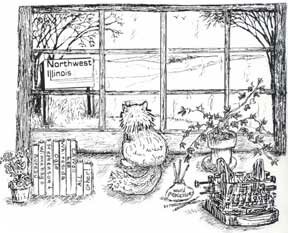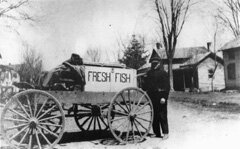
Discover rewarding casino experiences. 
|
“Trade barriers,” loosely defined, said that no “foreign goods” could be sold in the specific state meaning merchandise acquired in another state ... Kind of a hardship for the peddler who had little cash to buy additional had he sold near the state line!. In the states of Pennsylvania, Georgia and Tennessee law said that those who were disabled from procuring a livelihood by labor due to age, loss of arm or leg or other bodily infirmity only could sell. Other obstacles were thrown in the way of the peddler. Such severe rulings were permanently set in New York state where a fine of $25 was put to a peddler carrying “foreign goods” or broke other rules; $10 if not producing a license. Peddlers must know the laws anywhere. A Secretary of State notified a county clerk of rules and they would be posted at the “bulletin board” of the local general store where the proprietor gladly hung them up along with the names of the peddlers currently plying the area’s roads. Peddlers were competition to storekeepers. They had no property to keep up, taxes on them to pay, insurance if purchased, hauling charges expenses in procuring from a distant rail head or wholesaler and etc. The local newspaper editor, too, would publish peddlers lurking about. They didn’t advertise so to print rules and regulations, the peddler might be omitting and fined in retaliation!! A sheriff or justice of the peace could make a bit from selling license or from a fine. But still peddlers were numerous. No, the life of a peddler was not easy but many made a comfortable living, had a homestead and family and did alright walking roads of America. Many actually moved up the ladder of success, so to speak, by becoming a storekeeper ... A set spot from which to do business. Some of them became commercial or political figures as time passed. One of those was Dexter Knowlton in Stephenson County in the early decades of the nineteenth century. Wanting to explore the West, Knowlton left the steep hills of his native New York state to check out the prairie state of Illinois. Arriving in Freeport in Stephenson having sold a selective supply of peddlers’ goods all along the way to help with expenses and make a bit of profit for his setting up in business once he got to his destination. He went to store keeping and did well; well enough that he founded a bank also and was noted for buying the first safe in the county, bringing it from Chicago by ox team. The safe kept cash and valuables of pioneers like himself who wished to have the stuff with which to invest. He so gained in prestige that he was asked to join the Board of Directors of the Galena and Chicago Railroad and, too, become a candidate for governorship of Illinois which campaign he did lose. His successes were many and several of his descendants were well-known in the community years after. Even in his later age his habits of peddling were still alive when he vacationed in Saratoga Springs in his native state to which he took bottles of “Congress Water” to sell to assist in the cures as well as make a few dollars! Job Dodge, a pioneer merchant of Whiteside County, followed the same line, coming from Vermont in 1838 though he “had not yet achieved his majority.” In the New England states, his region of birth and growing up, peddlers were a very common sight in the steep, inaccessible mountains where homesteads and hamlets were inconvenient distances from one another. Dodge, however, stopped at Portland Township in Whiteside, a pleasant riverside settlement only a remnant of which remains. He’d had a horse and wagon in which to carry a healthy supply of peddlers’ goods and he, too, sold them along the way. He put together a store in Portland and took on a partner, A.T. Wiggins, but he kept his peddler’s experience fresh by traveling the peat bogs, marshes, prairies and gentle hills of Whiteside and beyond for several years. Unfortunately Wiggins died in the early 1840’s so Dodge was left to carry on at peddling and keeping store plus, with his boundless energies and determination, a pork packing business. Having no refrigeration in those days meat must be salted or smoked or preserved in some way to be able to have it in future. Pork Packing was Big wherever. A reference stated that at one point Dodge used $25,000 to package an order of meat, the pork being sent usually to the lead miners at Galena or by flatboat to St. Louis via Albany Landing just to the west of his site which by the ‘40’s had moved to Prophetstown where he continued in business for many years, aiding in the growth and progress of the community throughout but never forgetting his peddler days and the lessons learned. Always on the look-out for modern merchandising techniques, however, he carried his pork packing goods to Peoria where it was shipped on the I&M Canal to Chicago and who knows what other destinations. To remind us again that times were different than now, the most used “currency” was coon skins traded for tobacco and whiskey and which Dodge bartered in also though he always kept “luxuries” on hand such as calico and coffee, the notions, as they were called that were always sellers from his younger days. It was such “notions” that Abraham Lincoln dealt in which as a young lad Tom Lincoln took him and the family from Indiana to Illinois. Abe, the gangly boy had worked so hard to save up $30 with which he bought a supply of pins, needles, thread, buttons, knives and forks that he peddled along the trail. Of course, we know that for awhile he was a storekeeper but as a peddler it was, perhaps, where he first developed the fine ability he was noted for to “read” people, a priceless trait of our beloved president. Peddling by foot or horse and cart was a rough way of life but it obviously appealed to the restless or wanderer. Prior to the Civil War peddlers were so numerous that even innkeepers had to post rules for them to observe when staying at the inn ... Only five to a bed and they must remove their shoes before bedding down! Many peddlers, however, were locally-based and everyone knew them ... Take the milk peddler who came with a cart with a milk can from which he’d fill the housewife’s little tin pail or a store bought pitcher from Sears-Roebuck special. Every town had such plus, perhaps someone who made cheese or had honey, sharpened scissors, made tin kettles to size, had clay pipes, apples, cornmeal and, as the sign says, “Fresh Fish” as in Loran at the turn-of-the century when Jake Esselborn whose cart was a familiar sight according to Kathryn Nelson, Pearl City, who recalled stories about the early days up there. Thanks, Mrs. N. Just about every item besides the common pins and needles and thread, calico and coffee. Believe it or not, sewing machines were a popular item to be sold along the highways and by-ways by the wandering peddler. A source states that a country general store served an area of about five miles in radius, the peddler more, of course, but then the railroads came in and shopping could be done farther afield. Traveling salesmen replaced the peddler, a fancier type all around. They weren’t all full of hype like Harold Hill but they were plentiful. Many were signed in at the Commercial Hotel on Carroll Street, Lanark, (the Glendora or Germaina, its other names or at the Lanark House at rail side). All sorts of new products could be sold by the traveling man.
Although the peddler may have been a “thorn-in-the-side” of the general storekeeper he was a necessary and useful part of our past. And still is in some ways. Think about them ... Cosmetics, candles, pots and pans, seed corn, frozen food, magazines, books, a wide variety yet. Although they no longer drive brightly painted wagons with exotic scenes on the sides or printing telling their product (like you might see at the Stephenson County Historical Museum), they still bring a hint of another world to a quiet household. And only cash is taken in trade for the “spices of Araby” nor home laid eggs taken in exchange for a crocheted antimacassar, conversation may be eagerly awaited from today’s peddler as in the olden days.
|





